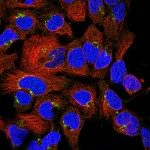Lien vers Pubmed [PMID] – 18410485
Traffic 2008 Jul;9(7):1101-15
Transmissible spongiform encephalopathies (TSEs) are a group of diseases of infectious, sporadic and genetic origin, found in higher organisms and caused by the pathological form of the prion protein. The inheritable subgroup of TSEs is linked to insertional or point mutations in the prion gene prnp, which favour its misfolding and are passed on to offspring in an autosomal-dominant fashion. The large majority of patients with these diseases are heterozygous for the prnp gene, leading to the coexpression of the wild-type (wt) (PrP(C)) and the mutant forms (PrPmut) in the carriers of these mutations. To mimic this situation in vitro, we produced Fischer rat thyroid cells coexpressing PrPwt alongside mutant versions of mouse PrP including A117V, E200K and T182A relevant to the human TSE diseases Gestmann-Sträussler-Scheinker (GSS) disease and familial Creutzfeldt-Jakob disease (fCJD). We found that coexpression of mutant PrP with wt proteins does not affect the glycosylation pattern or the biochemical characteristics of either protein. However, FRET and co-immunoprecipitation experiments suggest an interaction occurring between the wt and mutant proteins. Furthermore, by comparing the intracellular localization and detergent-resistant membrane (DRM) association in single- and double-expressing clones, we found changes in the intracellular/surface ratio and an increased sequestration of both proteins in DRMs, a site believed to be involved in the pathological conversion (or protection thereof) of the prion protein. We, therefore, propose that the mutant forms alter the subcellular localization and the membrane environment of the wt protein in co-transfected cells. These effects may play a role in the development of these diseases.

